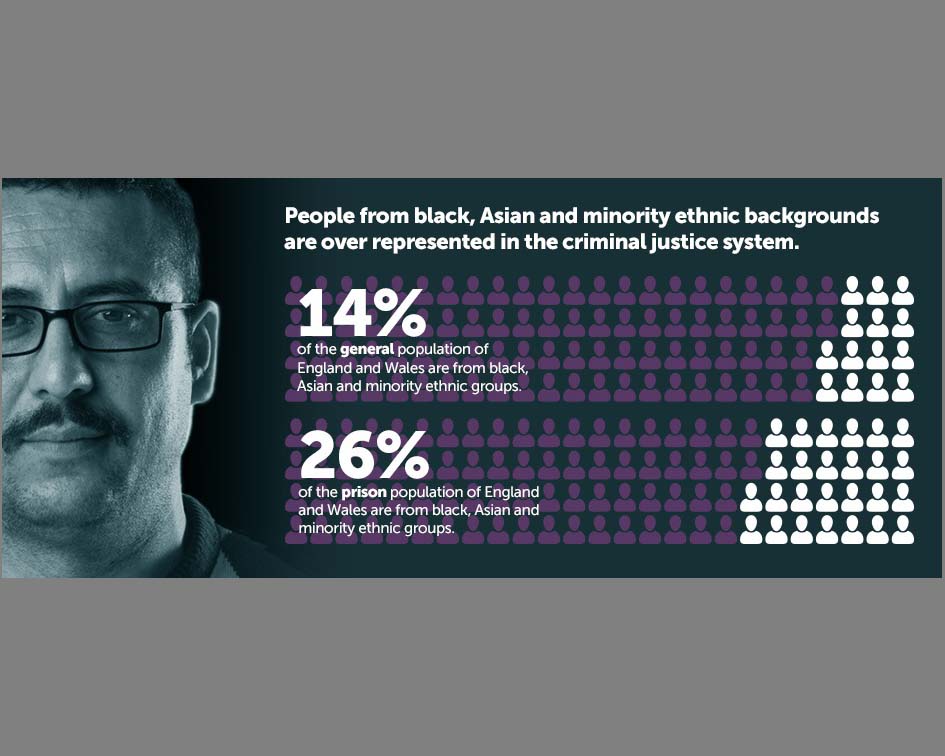Jessica Mullen, Senior Policy & Project Officer at Clinks, blogs about the Young Review into improving outcomes for young black and Muslim men in the criminal justice system.
The disproportionate numbers of Black, Asian and Minority ethnic prisoners in our criminal justice system, and the disproportionately worse outcomes they face, have been the subject of numerous reports and reviews over decades.
Despite this, over the last nine months I have attended meetings with a range of organisations and statutory agencies who all agree that this issue remains a serious and significant challenge for our Criminal Justice System, which so far we have failed to adequately address.
These meetings have taken place as part of the independent Young Review into improving outcomes for young black and Muslim men in the criminal justice system, led by Baroness Lola Young of Hornsey, with the support of the Black Training and Enterprise Group and Clinks. It has brought together a Task Group of representatives from the voluntary, statutory, private and academic sectors to explore how we can embed sustainable and practical solutions that address the disparities faced by this group.
Working with the support of Justice Secretary Chis Grayling and the Ministry of Justice, the Young Review has chosen to specifically focus on black and/or Muslim men aged between 18 and 24[i] because the evidence demonstrates there are critically high proportions of this group at all stages of the Criminal Justice System and reporting the least positive outcomes and perceptions of prison life compared to all other groups.
It is worth noting that disparities in the criminal justice system for this group are part of a complex mix of educational, employment, health and social disadvantage that have characterised many of their lives. This serves as a warning against making over-simplified assumptions about the connections between race, ethnicity and criminal justice outcomes, and points to the need for a multi-agency, multi-partner approach. However when it comes to race, across all social policy areas, and all sectors, it seems impossible to deny that there has in the past been a lack of will and/or leadership within society to effect real change.
Therefore the Young Review hopes to go some way towards placing these issues back on the agenda to ensure that in the newly configured criminal justice environment action takes place in response to them.
Our aim is not to undertake new research to find new solutions to these issues but to consider how the vast amount of existing knowledge and data on this subject can be applied in the significantly reformed commissioning and service delivery environment introduced by the Transforming Rehabilitation reforms. Our interim report, published in January, highlights 5 guiding principles for commissioners and providers:
- Ethnicity, faith and culture has a key role in promoting sustained desistance from crime:
- Leadership from government and statutory agencies is essential to ensure a proactive approach to diversity, inclusion and cultural competence and in the delivery of criminal justice services
- The experience, understanding and knowledge that resides in communities is crucial in supporting offenders to desist in prison and ‘through the gate’.
- Commissioning frameworks must identify and address specific needs associated with young black and/or Muslim men.
- Systematic and meaningful consultation with service users that provides evidence of the reasons for and solutions to the disproportionate numbers of young black and/or Muslim males in the CJS.Despite the insight, robust research and clear and valid recommendations of previous reviews, improving the outcomes faced in the criminal justice system by young black and Muslim men is an ambitious task. Our final report on how we might finally do so will be published in Autumn; in the meantime, you can find out more and read the interim report at www.youngreview.org.uk.
[i] In this report, we use the term ‘young black and/or Muslim’ to refer to men aged 18-24 who identify as black British; black African; black Caribbean; Muslim or mixed heritage/origin where it includes one or more of above.

